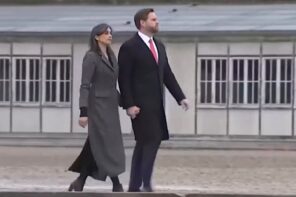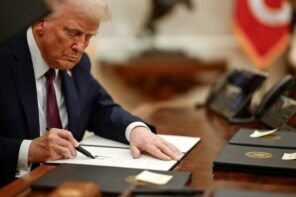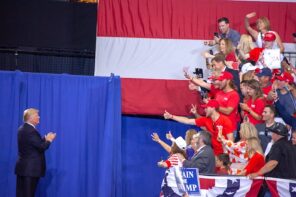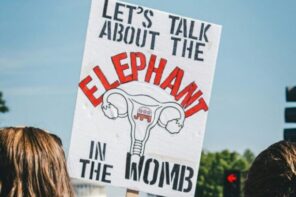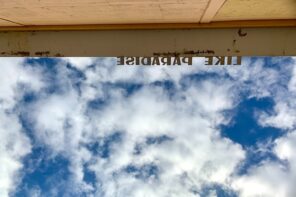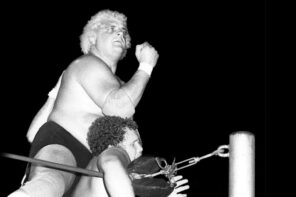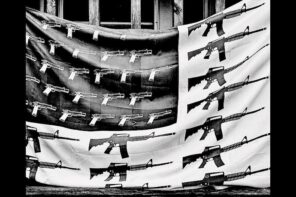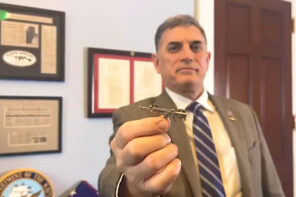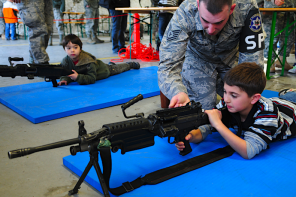The King was in a foul mood. Maybe it was the current state of politics, or merely the undercooked boar he’d had at the previous night’s banquet. Letting out a deep sigh, he growled, “Will no one rid me of this turbulent priest?”
England’s King Henry II was referring to Archbishop Thomas Becket, who had on numerous occasions asserted the rights of the church over that of the Crown.
A short time later, four knights arrived at Canterbury Cathedral, and brutally assaulted the unarmed cleric, hacking at him with their swords. The death-blow severed the top of Becket’s head, scattering blood and brains on the floor of the cathedral.
It was a horror nearly unparalleled in the history of church-state relations. Pope Alexander III excommunicated all four knights, but not King Henry. The Pontiff demanded that Henry publicly atone for inciting them to murder. This the King eventually did at Normandy’s Avranches Cathedral, barefoot and clad in sackcloth.
Did the King issue a contract for political assassination? Historians differ on the precise wording of his “turbulent priest” aside, but Henry does seem to have left no doubt that Becket had it coming to him. His overeager men at arms were more than pleased to fulfill their monarch’s wishes.
Fast-forward to 2016. An aspiring head of state, in a country across the ocean, stands before a microphone and despairs of what could happen if his opponent, Hillary Clinton, is elected. What, O what will befall the gun-control protections of the Second Amendment then?
“If she gets to pick her judges, nothing you can do, folks,” shrugs Donald Trump. The boos of the crowd egg him on. He growls in an aside: “Although the Second Amendment people—maybe there is, I don’t know.”
Who are these “Second Amendment people,” and what might they do? Are they, as the campaign spin doctors insist, gun-industry lobbyists who might just redouble their political contributions? Or are they mentally unhinged gun-owners, who might load up their pickup trucks with rifles and ammo on their candidate’s say-so, and begin searching for a convenient perch for a sniper attack?
That’s the beauty of an aside like King Henry’s or candidate Donald’s. It implants a disruptive idea, while maintaining plausible deniability.
The political power of the medieval papacy being what it was, the King had to show up barefoot before the pope’s official representative and publicly confess his sin. Were the worst to happen tomorrow, and some gun-toting extremist were to take the Donald up on his offhand suggestion, what are the chances he would choose the path of public penitence?
Judging from the candidate’s past remarks, the answer is, “Not yuge.” Remember, this is the man who, when asked if he had ever prayed for forgiveness, replied “I am not sure I have.”
“I just go on and try to do a better job from there. I don’t think so. I think if I do something wrong, I think, I just try and make it right. I don’t bring God into that picture. I don’t.”
Perhaps observing the shock that was appearing on the faces of his audience, Trump quickly clairified that, while he hasn’t directly asked God for forgiveness, he has engaged in a forgivenessy sort of activity, the Sacrament of Communion: “When I drink my little wine—which is about the only wine I drink—and have my little cracker, I guess that is a form of asking for forgiveness, and I do that as often as possible because I feel cleansed. I think in terms of ‘let’s go on and let’s make it right.’”
In politics, words have consequences. They are, in fact, the very stuff of politics—as any Presidential speechwriter, feeding the voracious teleprompter, will attest.
King Henry acknowledged that hard truth, as he stood barefoot and penitent before his God. It seems to be a lesson this aspiring President has yet to learn.

